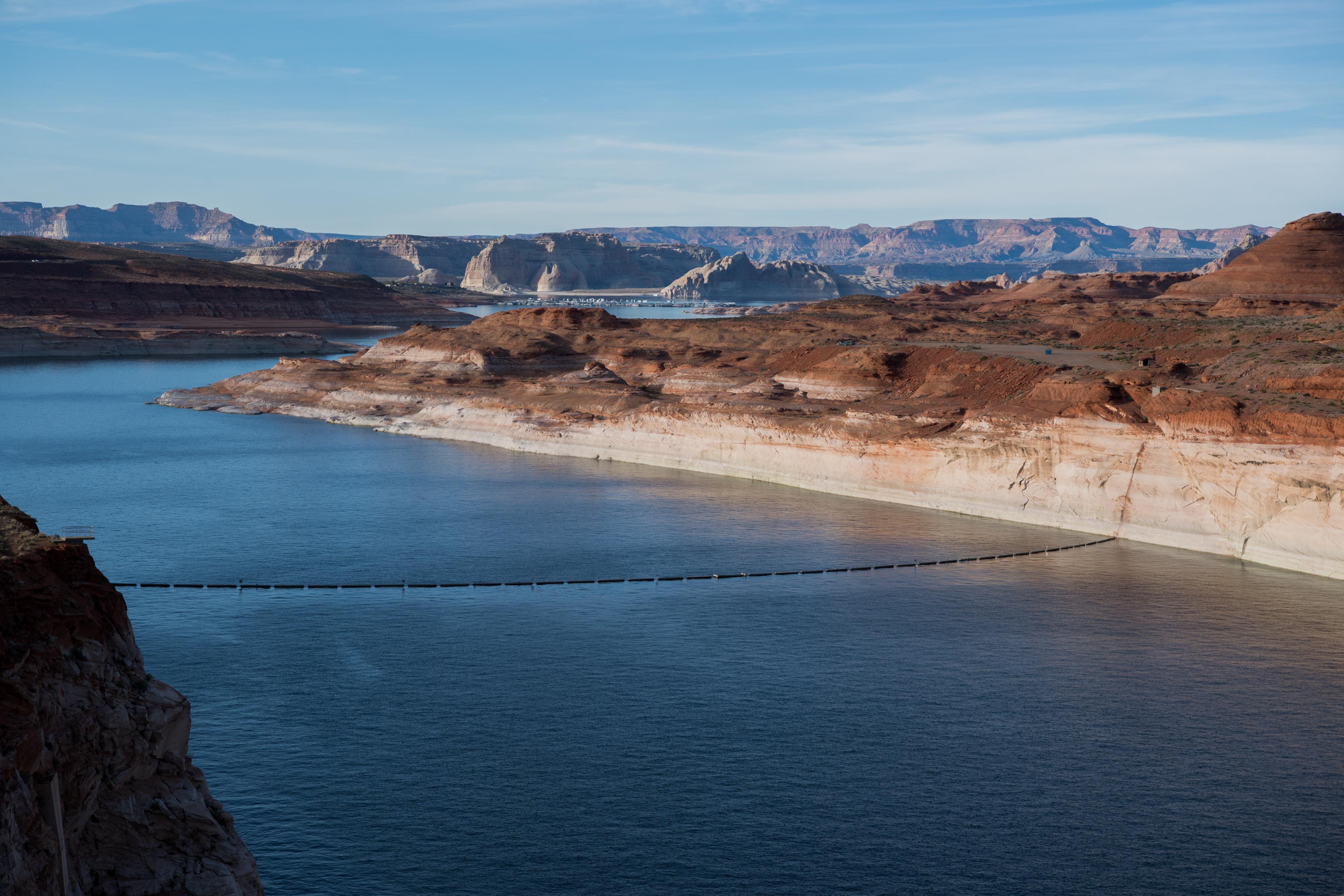Robust collaboration includes Basin states, Tribes, stakeholders and Mexico
 Lake Powell in Arizona
Lake Powell in Arizona
WASHINGTON – The Department of the Interior today announced that it is initiating the formal process to develop future operating guidelines and strategies to protect the stability and sustainability of the Colorado River. The new guidelines will replace the 2007 Colorado River Interim Guidelines for Lower Basin Shortages and the Coordinated Operations for Lake Powell and Lake Mead, which are set to expire at the end of 2026.
The robust and transparent public process will gather feedback for the next set of operating guidelines, including new strategies that take into account the current and projected hydrology of the Colorado River Basin. The Basin is currently facing an historic drought, driven by climate change, that is increasing the likelihood of warming temperatures and continued low-runoff conditions, and therefore reduced water availability, across the region.
"The Biden-Harris administration has held strong to its commitment to work with states, Tribes and communities throughout the West to find consensus solutions in the face of climate change and sustained drought. Those same partnerships are fundamental to our ongoing work to ensure the stability and sustainability of the Colorado River Basin into the future,” said Deputy Secretary Tommy Beaudreau. “As we look toward the next several years across the Basin, the new set of operating guidelines for Lake Powell and Lake Mead will be developed collaboratively based on the best-available science.”
"Developing new operating guidelines for Lake Powell and Lake Mead is a monumentally important task and must begin now to allow for a thorough, inclusive and science-based decision-making process to be completed before the current agreements expire in 2026," said Reclamation Commissioner Camille Calimlim Touton. "The Bureau of Reclamation is committed to ensuring we have the tools and strategies in place to help guide the next era of the Colorado River Basin, especially in the face of continued drought conditions.”
The process announced today is separate from the recently announced efforts to protect the Colorado River Basin through the end of 2026. The Supplemental Environmental Impact Statement to revise the December 2007 Record of Decision will set interim guidelines through the end of 2026; the process announced today will develop guidelines for when the current interim guidelines expire.
The Notice of Intent to prepare an Environmental Impact Statement asks the public to consider the past 15 years of operating experience since adoption of the 2007 Interim Guidelines, as well as how the best-available science should inform future operational guidelines and strategies that can be sufficiently robust and adaptive to withstand a broad range of hydrological conditions. The NOI also asks the public to consider how and whether the purpose and elements of the 2007 Interim Guidelines should be retained, modified, or eliminated to provide greater stability to water users and the public throughout the Colorado River Basin. The NOI will be available for public comment until August 15, 2023.
While the post-2026 process would only determine domestic operations, the Biden-Harris administration is committed to continued collaboration with the Republic of Mexico. It is anticipated that the International Boundary and Water Commission will facilitate consultations between the United States and Mexico, with the goal of continuing the Binational Cooperative Process under the 1944 Water Treaty.
The Bureau of Reclamation will host three virtual public meetings. During these meetings, Reclamation will provide summary information and receive oral comments. The meetings are:
- Monday, July 17, 2023, 1 p.m. to 2 p.m. (MDT) – Register
- Tuesday, July 18, 2023, 10 a.m. to 11 a.m. (MDT) – Register
- Monday, July 24, 2023, 6 p.m. to 7 p.m. (MDT) – Register
President Biden’s Investing in America agenda represents the largest investment in climate resilience in the nation’s history and is providing pivotal resources to enhance the resilience of the West to drought and climate change, including to protect the short- and long-term sustainability of the Colorado River System. Through the Bipartisan Infrastructure Law, Reclamation is investing $8.3 billion over five years for water infrastructure projects, including water purification and reuse, water storage and conveyance, desalination and dam safety. The Inflation Reduction Act is investing an additional $4.6 billion to address the historic drought.
To date, the Interior Department has announced the following investments for Colorado River Basin states, which will yield hundreds of thousands of acre-feet of water savings each year once these projects are complete:
- $281 million for 21 water recycling projects that are expected to increase annual water capacity by 127,000 acre-feet annually
- Up to $233 million in water conservation funding for the Gila River Indian Community, including $83 million for a water pipeline project and an additional $50 million from the Inflation Reduction Act through the Lower Colorado River Basin System Conservation and Efficiency Program, which will also provide similar investments in 2024 and 2025
- Eight new System Conservation Implementation Agreements in Arizona that will commit water entities in the Tucson and Phoenix metro areas to conserve up to 140,000-acre feet of water in Lake Mead in 2023, and up to 393,000-acre feet through 2025
- Over $73 million for infrastructure repairs on water delivery systems, $19.3 million in fiscal year 2022 and another $54 million announced last month
- $71 million for 32 drought resiliency projects to expand access to water through groundwater storage, rainwater harvesting, aquifer recharge and water treatment
- $20 million in new small surface and groundwater storage investments


